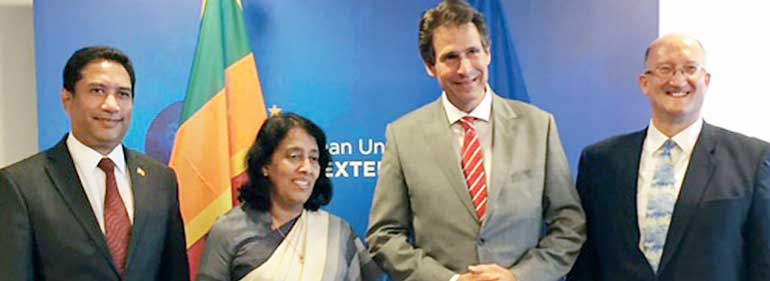Tuesday Feb 17, 2026
Tuesday Feb 17, 2026
Thursday, 21 July 2016 00:37 - - {{hitsCtrl.values.hits}}
 Foreign Affairs Ministry Secretary Mrs Chitranganee Wagiswara (second from left) with Gunnar Wiegand, Managing Director for Asia and the Pacific at the European External Action Service. Ambassador to the EU David Daly (right) is also present
Foreign Affairs Ministry Secretary Mrs Chitranganee Wagiswara (second from left) with Gunnar Wiegand, Managing Director for Asia and the Pacific at the European External Action Service. Ambassador to the EU David Daly (right) is also present
The Sri Lanka-European Union Joint Commission on Tuesday in Brussels discussed the procedure for assessing the GSP+ application that was handed over late last month along with plans to increase lending to an estimated Rs. 34.3 billion for various projects as part of regular engagement, a statement said.
The Joint Commission welcomed Sri Lanka’s application for access to the trade concessions under the EU’s Generalised Scheme of Preferences Plus (GSP+) as a sign of Sri Lanka’s renewed commitment to meeting its wider international obligations, it added.
EU-SL...
“The parties discussed the procedure for assessing the application, which was presented to the EU at the end of June, in line with the GSP Regulation. The EU drew attention to the importance of continued positive progress in fulfilling Sri Lanka’s stated commitments which need to proceed in parallel. The Joint Commission also agreed to resume the EU-Sri Lanka investment dialogue.”
The European Investment Bank announced that it was currently negotiating a € 50 million (Rs. 8.2 billion) concessional loan with the Government of Sri Lanka for the Greater Colombo Wastewater Project. The EU reiterated its plans to widen its 2014-2020 development program to € 210 million (Rs. 34.4 billion) beyond rural development to provide grants for reconciliation and good governance. Discussions on the specific needs will continue with the Sri Lankan Government in the coming months.
The Joint Commission, which oversees the 1995 EU-Sri Lanka Cooperation Agreement on Partnership and Development, deals with a broad range of bilateral and multilateral issues of mutual interest. Its tasks are to ensure the proper functioning and implementation of the Agreement; set priorities and make recommendations.
All three Working Groups established under the terms of the Joint Commission reported back from their respective meetings held in January (the Working Group on Governance, Rule of Law and Human Rights) and in May (the Working Group on Trade and Economic Cooperation Issues, and the Working Group on Development Cooperation).
“The parties welcomed the recent lifting of the EU ban on export of fish from Sri Lanka. This was achieved due to the extensive improvements made by the Government of Sri Lanka in fisheries management and control, consistent with its international obligations. It was agreed that the close relationship established on fisheries between the two parties will continue.”
The meeting provided an opportunity to exchange views on the state of implementation of the UN Human Rights Council resolution of 1 October 2015, which was co-sponsored by a number of UN Member States and Sri Lanka.
The parties noted the progress made and indicated that further measures would be pursued and progress would continue for the implementation of the resolution. Progress with regard to the release of land and the normalisation of the life in the North and East of the country, the repeal of the Prevention of Terrorism Act (PTA) and the release or prosecution of detainees held under the PTA, and the establishment of the transitional mechanisms for truth, reconciliation, justice and reparations were also discussed. Sri Lanka provided updates on the process of drawing up the new Constitution.
Reuters: Britain’s economy may slip into recession next year following the vote to quit the European Union, the European Commission estimated on Tuesday in its first assessment of the economic impact of Brexit.
Last week the Commissioner for Economic Affairs, Pierre Moscovici, said the cumulative negative impact for British Gross Domestic Product (GDP) would be between about 1% and 2.5% by 2017.
Estimates prepared by the EU executive staff and released on Tuesday give more precise figures than those provided by Moscovici and add a breakdown for this and next year.
Britain is expected to endure a “substantial slowdown” which will limit its economic growth to between 1.3 and 1.6% this year, lower than earlier estimates of a 1.8% growth.
The European Commission’s simulations project a much worse situation for next year, when Britain may experience a 0.3% contraction in the worst scenario.
In the most optimistic scenario Britain’s Gross Domestic Product would grow 1.1% in 2017, still much less than the previously forecast 1.9% rise.
The 23 June Brexit referendum “will affect not only the UK but also the rest of the EU economy through several transmission channels, mainly uncertainty, investment, trade and migration,” the Commission added.
It estimated that GDP growth in the euro area would moderate marginally in 2016 to 1.5-1.6% and to slow further in 2017 to between 1.3 and 1.5%.
In the Commission’s latest economic forecasts released in May, the 19-country currency area was expected to grow 1.6% this year and 1.8% in 2017.
The Commission said that this assessment of the Brexit economic impact could change since the referendum had created an extraordinarily uncertain situation.
However, it added that the UK’s ‘leave’ vote had “generally increased risks to the outlook, particularly on the downside”.